Resume
LTAC Nurse Cover Letter Examples

May 29, 2025
|
12 min read
Craft your winning LTAC nurse cover letter with these simple tips and ensure you stand out like a stethoscope in the crowd. Learn how to showcase your skills and land your next long-term care adventure.
4.70 Average rating
Rated by 348 people
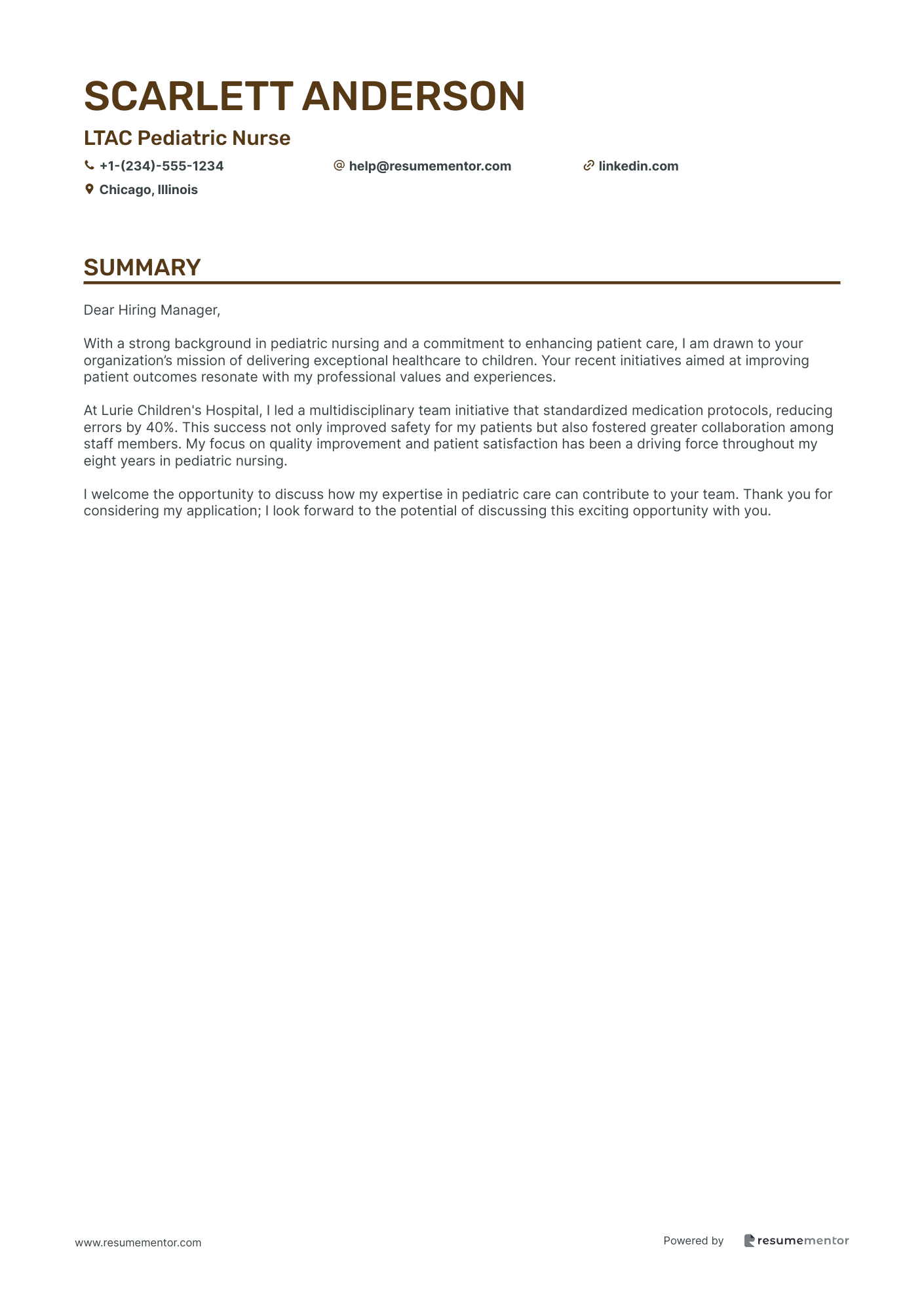
LTAC Pediatric Nurse
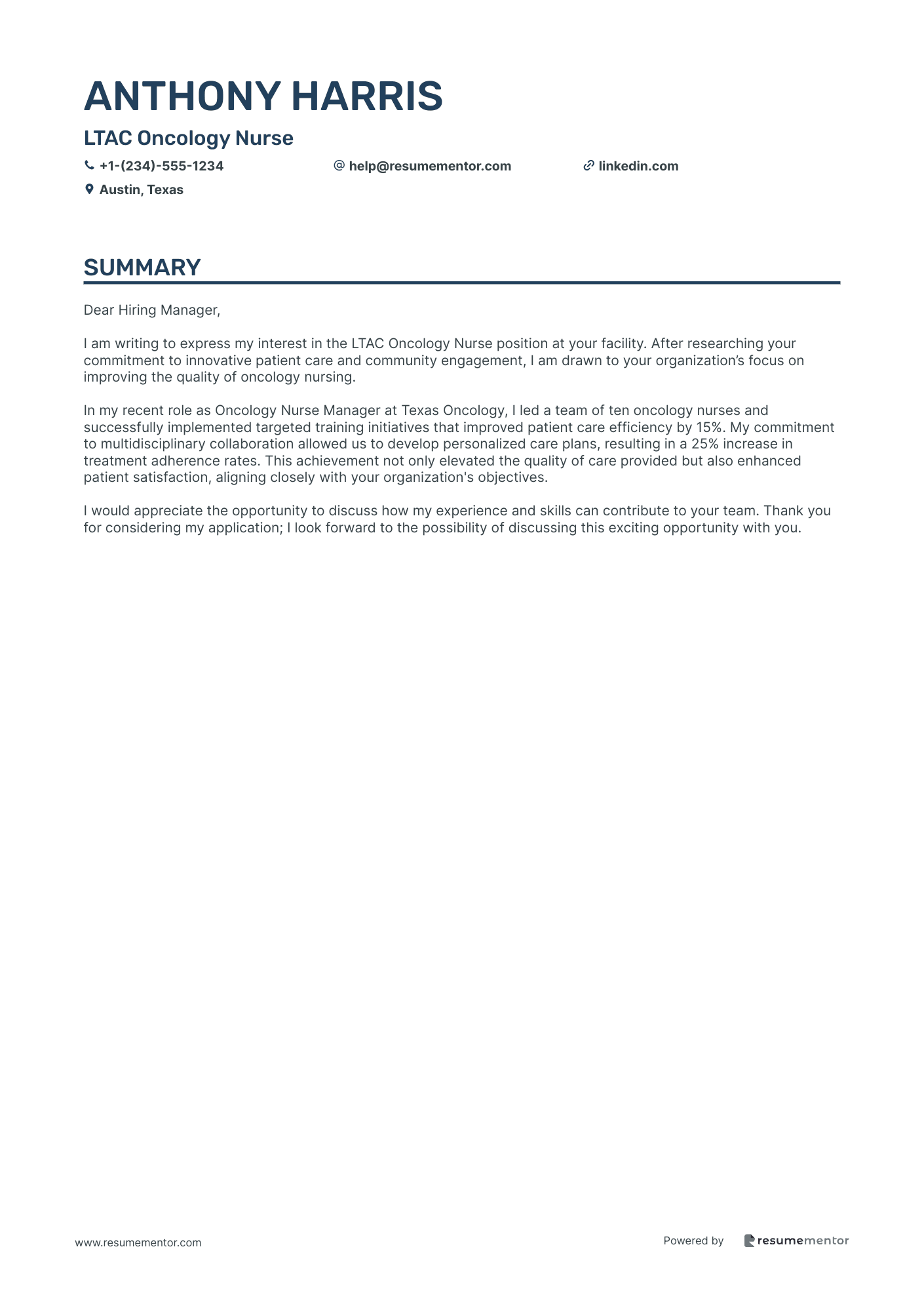
LTAC Oncology Nurse
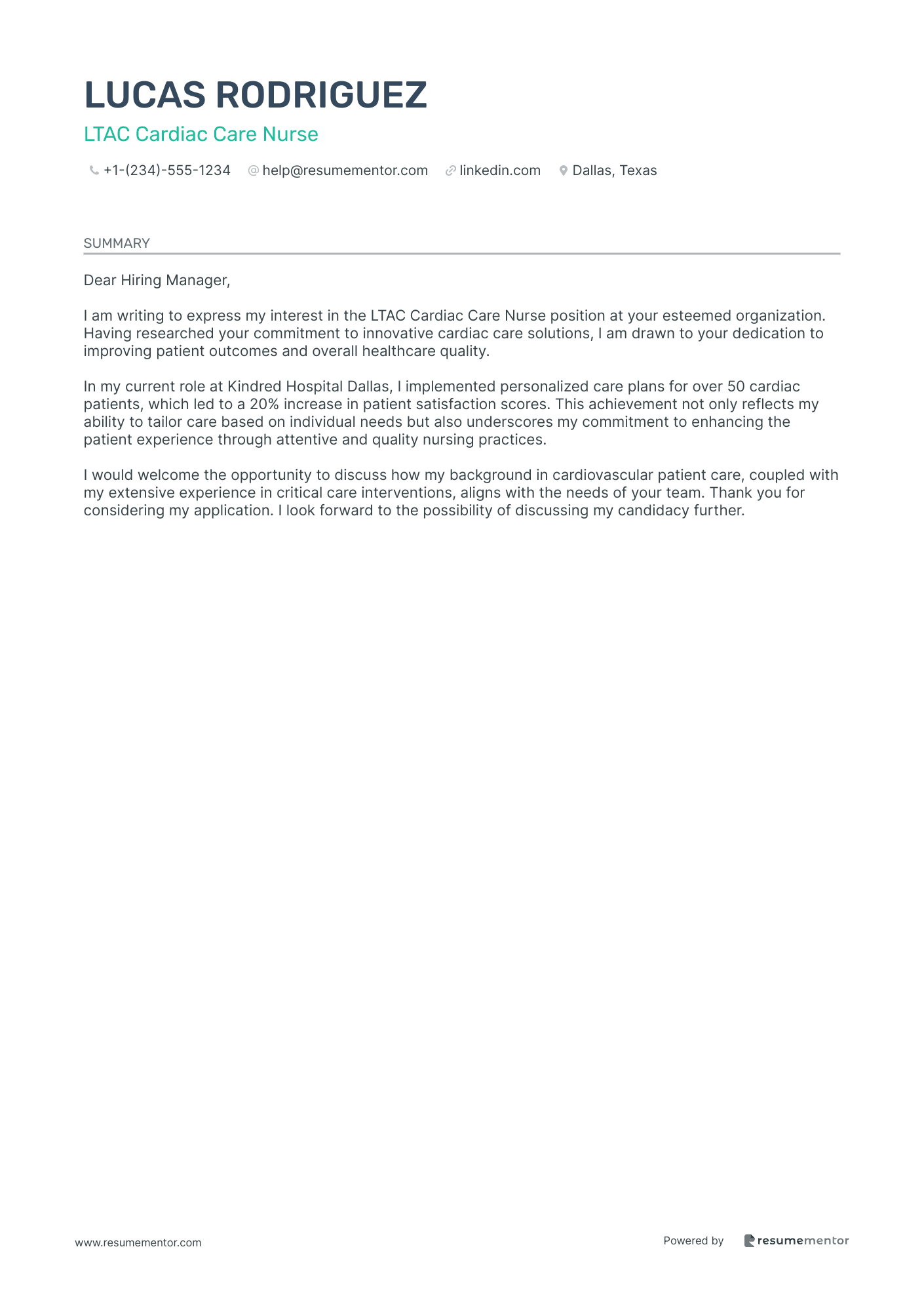
LTAC Cardiac Care Nurse
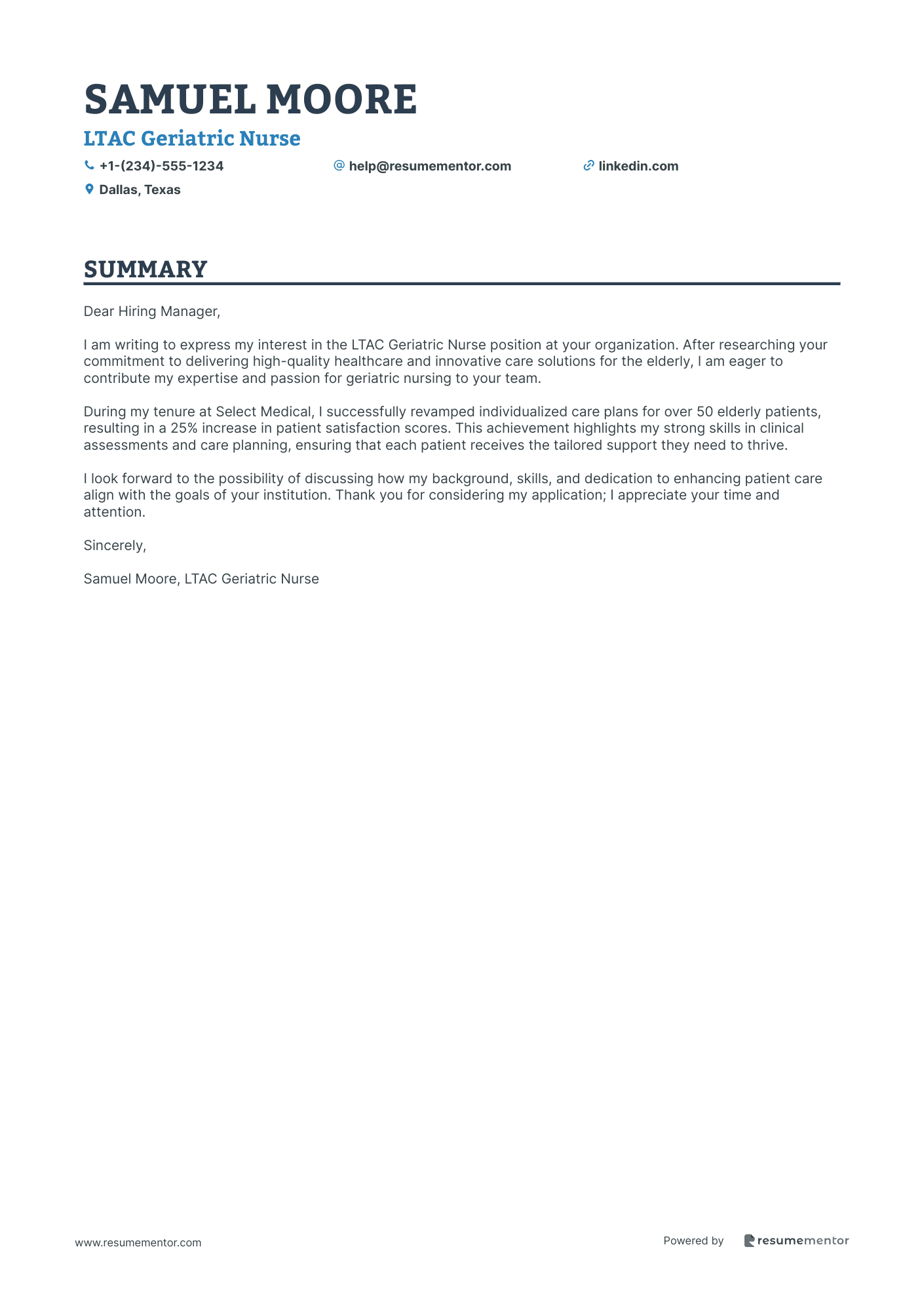
LTAC Geriatric Nurse
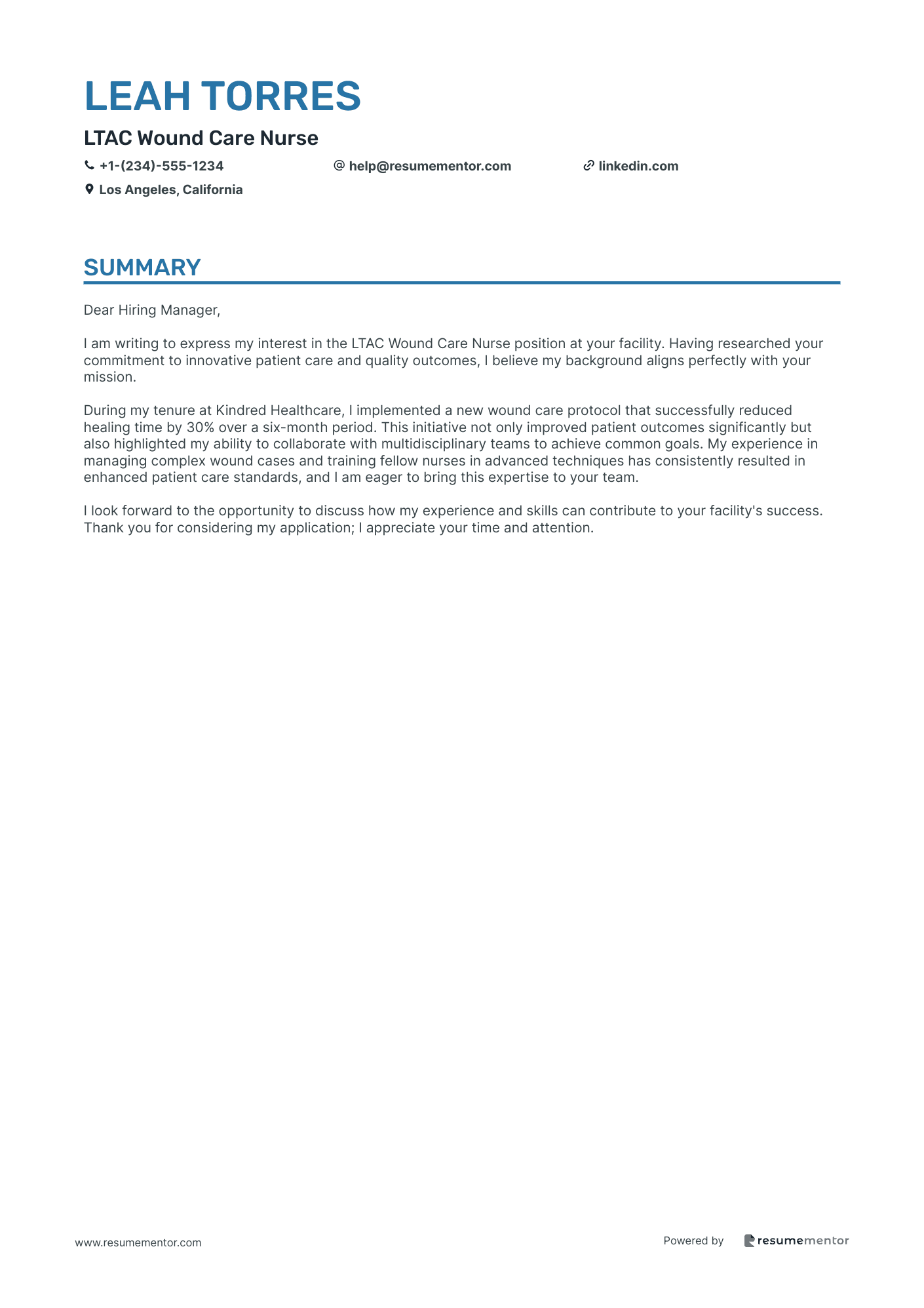
LTAC Wound Care Nurse
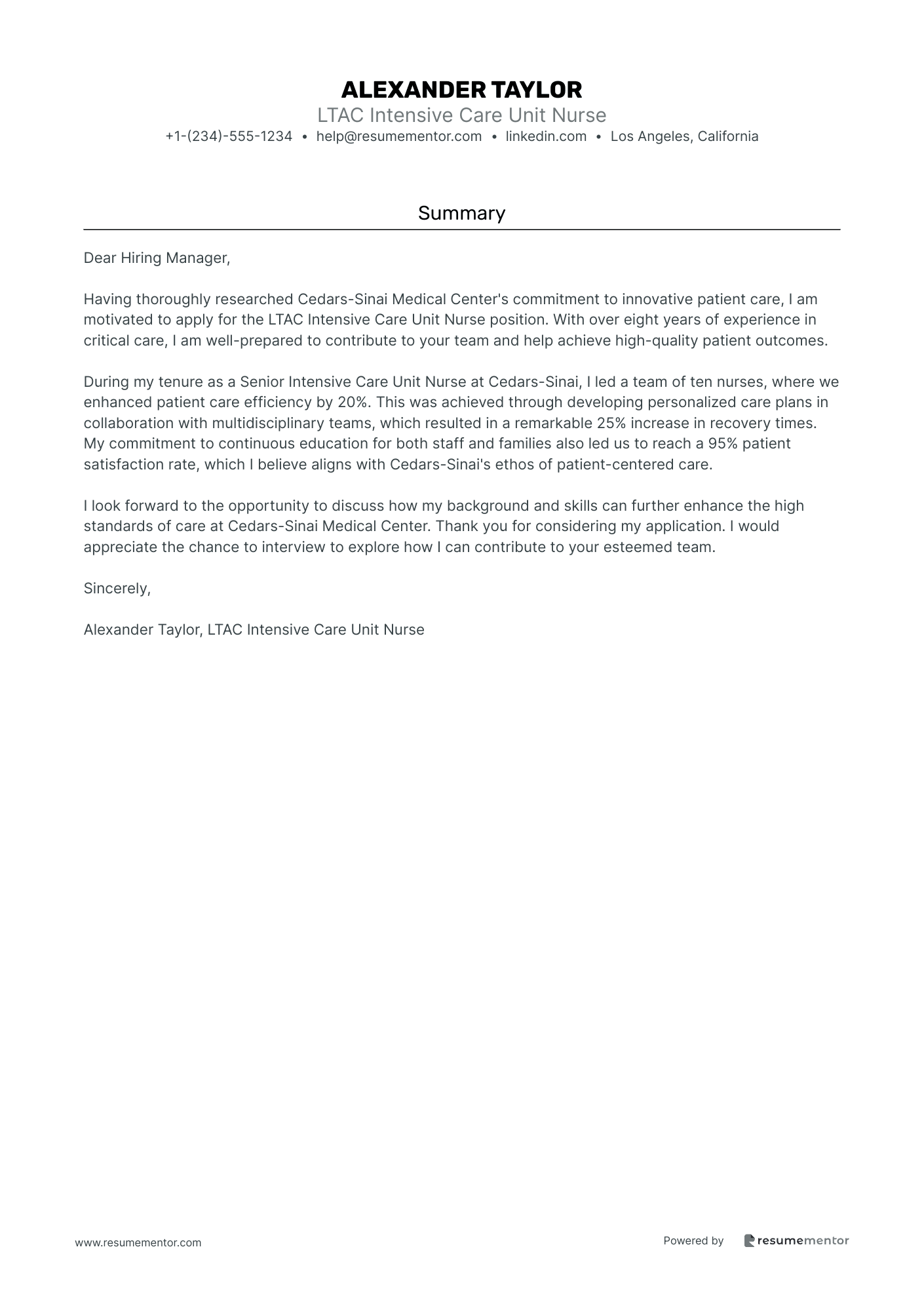
LTAC Intensive Care Unit Nurse
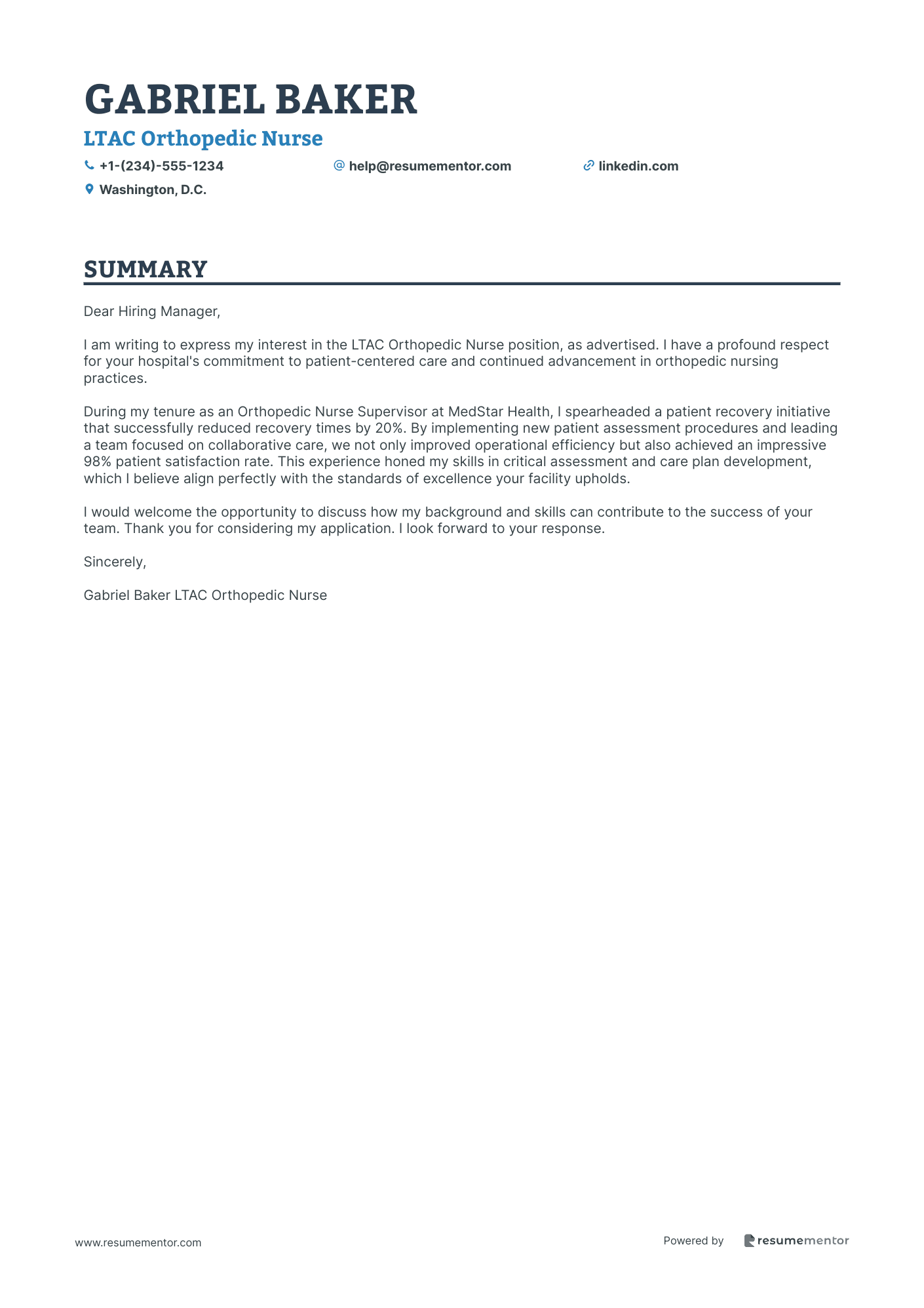
LTAC Orthopedic Nurse
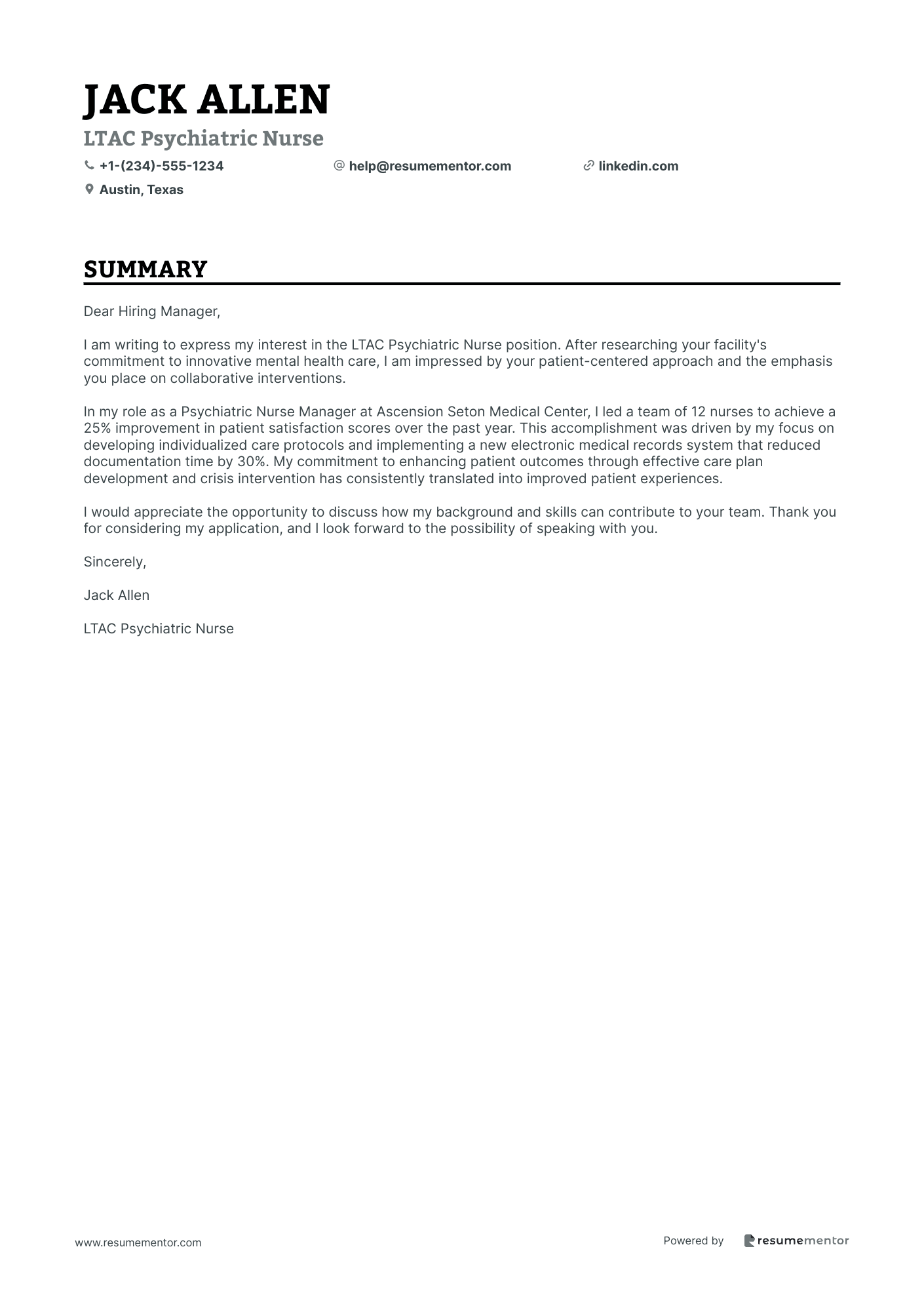
LTAC Psychiatric Nurse
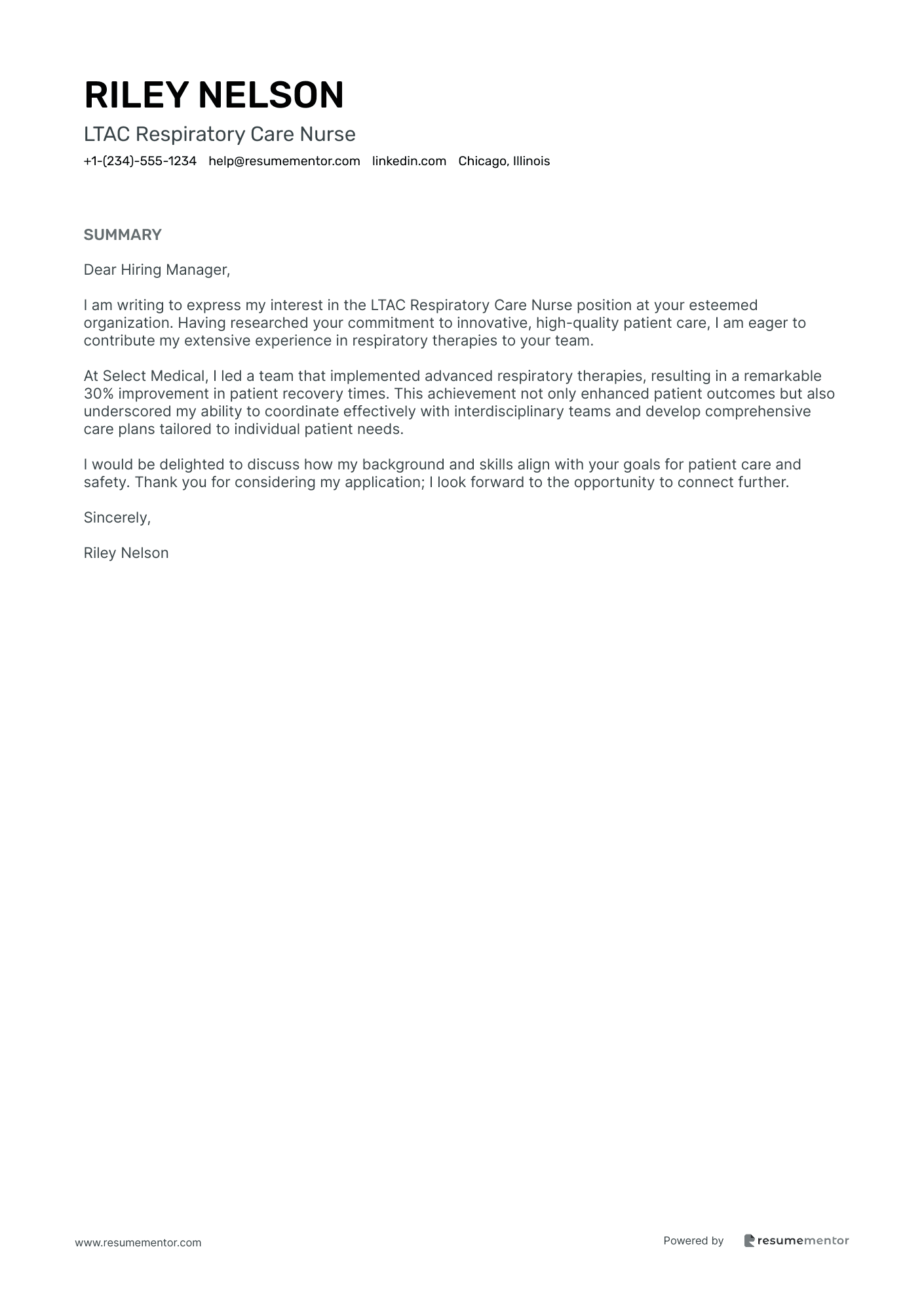
LTAC Respiratory Care Nurse
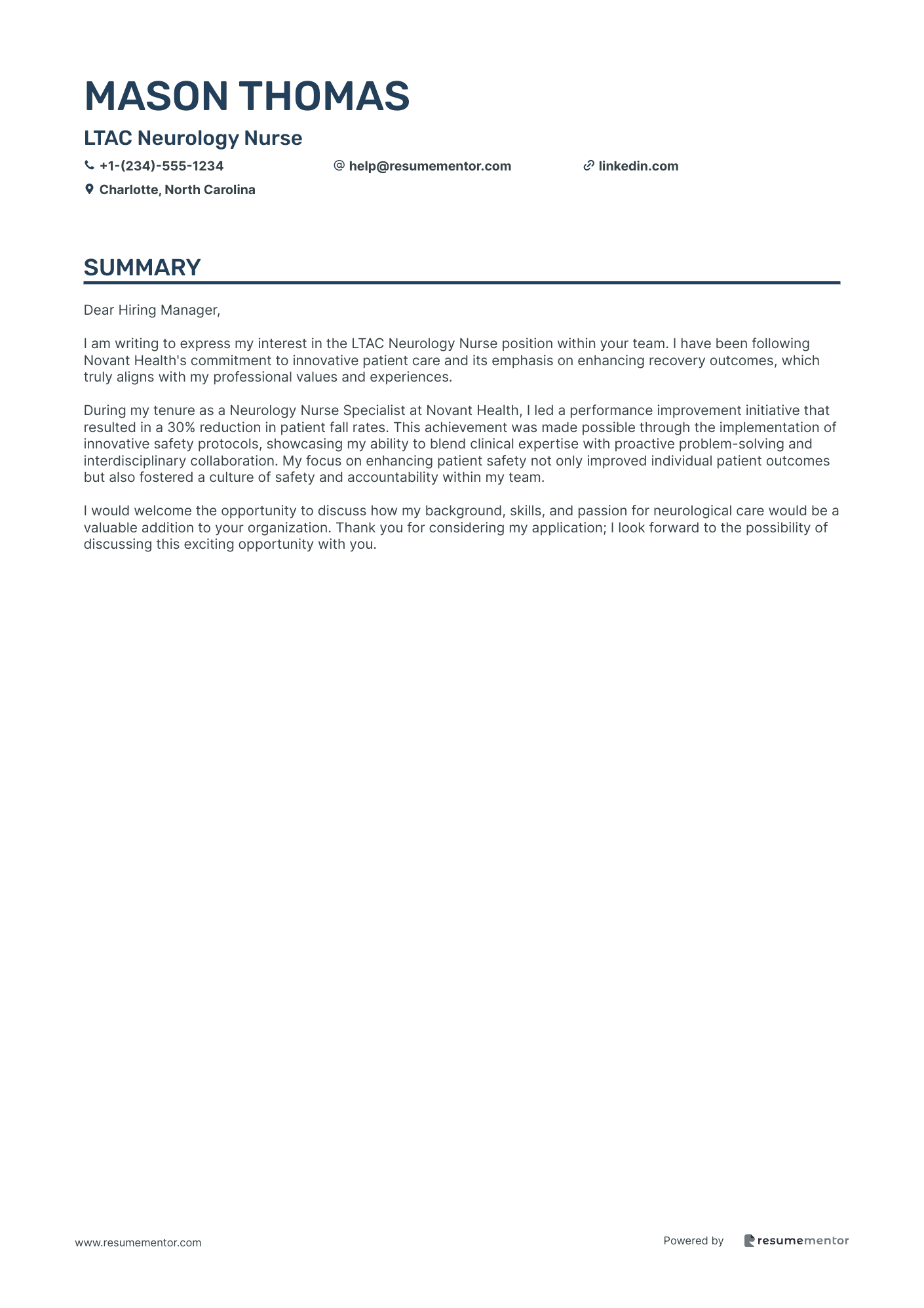
LTAC Neurology Nurse

LTAC Pediatric Nurse cover letter sample
When applying for this role, it's important to showcase any experience with pediatric care or critical nursing environments. Highlight any specialized training in areas like ventilator management or pediatric pain management. If you have certifications such as BLS or PALS, include these to strengthen your application. Use specific examples that demonstrate how your nursing interventions have improved patient outcomes, utilizing the 'skill-action-result' format. Discuss your ability to collaborate with multidisciplinary teams and how this has positively impacted patient care and family support.
Scarlett Anderson
LTAC Pediatric Nurse
Summary
Dear Hiring Manager,
With a strong background in pediatric nursing and a commitment to enhancing patient care, I am drawn to your organization’s mission of delivering exceptional healthcare to children. Your recent initiatives aimed at improving patient outcomes resonate with my professional values and experiences.
At Lurie Children's Hospital, I led a multidisciplinary team initiative that standardized medication protocols, reducing errors by 40%. This success not only improved safety for my patients but also fostered greater collaboration among staff members. My focus on quality improvement and patient satisfaction has been a driving force throughout my eight years in pediatric nursing.
I welcome the opportunity to discuss how my expertise in pediatric care can contribute to your team. Thank you for considering my application; I look forward to the potential of discussing this exciting opportunity with you.
LTAC Oncology Nurse cover letter sample
When applying for this role, it’s essential to showcase your experience in oncology nursing and any specialized training you've received. Highlight your ability to manage complex patient care, as this demonstrates your competence in addressing the unique needs of cancer patients. Include certifications like Chemotherapy Administration or Specialty in Oncology Nursing to reinforce your qualifications. Share specific examples of how your interventions have positively impacted patient outcomes, utilizing a 'skill-action-result' framework to illustrate your effectiveness and dedication to providing high-quality care.
Summary
Dear Hiring Manager,
I am writing to express my interest in the LTAC Oncology Nurse position at your facility. After researching your commitment to innovative patient care and community engagement, I am drawn to your organization’s focus on improving the quality of oncology nursing.
In my recent role as Oncology Nurse Manager at Texas Oncology, I led a team of ten oncology nurses and successfully implemented targeted training initiatives that improved patient care efficiency by 15%. My commitment to multidisciplinary collaboration allowed us to develop personalized care plans, resulting in a 25% increase in treatment adherence rates. This achievement not only elevated the quality of care provided but also enhanced patient satisfaction, aligning closely with your organization's objectives.
I would appreciate the opportunity to discuss how my experience and skills can contribute to your team. Thank you for considering my application; I look forward to the possibility of discussing this exciting opportunity with you.
LTAC Cardiac Care Nurse cover letter sample
When applying for this position, emphasize any relevant clinical experience in cardiac care or telemetry. Highlight your ability to monitor vital signs and interpret cardiac rhythms accurately. Certifications like Advanced Cardiac Life Support (ACLS) are crucial, so be sure to include them. Mention any teamwork skills, as collaboration with physicians and other healthcare professionals is essential. Provide specific examples of how your interventions have improved patient outcomes, using the 'skill-action-result' approach to showcase your impact on patient care and overall team performance.
Lucas Rodriguez
LTAC Cardiac Care Nurse
Summary
Dear Hiring Manager,
I am writing to express my interest in the LTAC Cardiac Care Nurse position at your esteemed organization. Having researched your commitment to innovative cardiac care solutions, I am drawn to your dedication to improving patient outcomes and overall healthcare quality.
In my current role at Kindred Hospital Dallas, I implemented personalized care plans for over 50 cardiac patients, which led to a 20% increase in patient satisfaction scores. This achievement not only reflects my ability to tailor care based on individual needs but also underscores my commitment to enhancing the patient experience through attentive and quality nursing practices.
I would welcome the opportunity to discuss how my background in cardiovascular patient care, coupled with my extensive experience in critical care interventions, aligns with the needs of your team. Thank you for considering my application. I look forward to the possibility of discussing my candidacy further.
LTAC Geriatric Nurse cover letter sample
When crafting your cover letter, focus on your clinical experience with older adults, especially in long-term care settings. Highlight any specialized training in geriatric care or certifications such as Basic Life Support (BLS) or Advanced Cardiac Life Support (ACLS). Emphasize your ability to manage chronic conditions, communication skills, and empathy. Discuss specific instances where you've improved patient outcomes or enhanced quality of life, using the 'skill-action-result' format. This approach can showcase your expertise and dedication to patient-centered care, making your application stand out.
Summary
Dear Hiring Manager,
I am writing to express my interest in the LTAC Geriatric Nurse position at your organization. After researching your commitment to delivering high-quality healthcare and innovative care solutions for the elderly, I am eager to contribute my expertise and passion for geriatric nursing to your team.
During my tenure at Select Medical, I successfully revamped individualized care plans for over 50 elderly patients, resulting in a 25% increase in patient satisfaction scores. This achievement highlights my strong skills in clinical assessments and care planning, ensuring that each patient receives the tailored support they need to thrive.
I look forward to the possibility of discussing how my background, skills, and dedication to enhancing patient care align with the goals of your institution. Thank you for considering my application; I appreciate your time and attention.
Sincerely,
Samuel Moore, LTAC Geriatric Nurse
LTAC Wound Care Nurse cover letter sample
When preparing your cover letter, showcase any specialized training in wound care or certifications such as Wound Care Certified (WCC) or Certified Wound Specialist (CWS). Highlight your hands-on experience with different types of wounds and your knowledge of healing protocols. Include details on how you have collaborated with multidisciplinary teams to create and implement effective care plans. Use the 'skill-action-result' format to illustrate how your interventions have led to improved patient outcomes, such as reduced infection rates or quicker recovery times.
Leah Torres
LTAC Wound Care Nurse
Summary
Dear Hiring Manager,
I am writing to express my interest in the LTAC Wound Care Nurse position at your facility. Having researched your commitment to innovative patient care and quality outcomes, I believe my background aligns perfectly with your mission.
During my tenure at Kindred Healthcare, I implemented a new wound care protocol that successfully reduced healing time by 30% over a six-month period. This initiative not only improved patient outcomes significantly but also highlighted my ability to collaborate with multidisciplinary teams to achieve common goals. My experience in managing complex wound cases and training fellow nurses in advanced techniques has consistently resulted in enhanced patient care standards, and I am eager to bring this expertise to your team.
I look forward to the opportunity to discuss how my experience and skills can contribute to your facility's success. Thank you for considering my application; I appreciate your time and attention.
LTAC Intensive Care Unit Nurse cover letter sample
When applying, emphasize your clinical experience in critical care settings. Highlight any specialized training or certifications like ACLS or CCRN that demonstrate your commitment to advanced patient care. Discuss your ability to assess and monitor patients effectively, ensuring timely interventions. Share examples of collaborative teamwork with physicians and other healthcare professionals that enhanced patient outcomes. Mention your experience with electronic health records and how it improved documentation accuracy and efficiency. Focus on your compassionate care and ability to support patients and families during challenging situations.
Alexander Taylor
LTAC Intensive Care Unit Nurse
Summary
Dear Hiring Manager,
Having thoroughly researched Cedars-Sinai Medical Center's commitment to innovative patient care, I am motivated to apply for the LTAC Intensive Care Unit Nurse position. With over eight years of experience in critical care, I am well-prepared to contribute to your team and help achieve high-quality patient outcomes.
During my tenure as a Senior Intensive Care Unit Nurse at Cedars-Sinai, I led a team of ten nurses, where we enhanced patient care efficiency by 20%. This was achieved through developing personalized care plans in collaboration with multidisciplinary teams, which resulted in a remarkable 25% increase in recovery times. My commitment to continuous education for both staff and families also led us to reach a 95% patient satisfaction rate, which I believe aligns with Cedars-Sinai's ethos of patient-centered care.
I look forward to the opportunity to discuss how my background and skills can further enhance the high standards of care at Cedars-Sinai Medical Center. Thank you for considering my application. I would appreciate the chance to interview to explore how I can contribute to your esteemed team.
Sincerely,
Alexander Taylor, LTAC Intensive Care Unit Nurse
LTAC Orthopedic Nurse cover letter sample
When applying for this role, it's important to highlight any relevant nursing experience, especially in orthopedics or long-term acute care. Emphasize strong patient assessment skills and your ability to develop care plans. If you have certifications like ACLS or PALS, include these to showcase your qualifications. Provide examples of how your nursing interventions improved patient outcomes or enhanced team collaboration, using the 'skill-action-result' format. Additionally, mention any specialized training in pain management or mobility support to demonstrate your expertise.
Gabriel Baker
LTAC Orthopedic Nurse
Summary
Dear Hiring Manager,
I am writing to express my interest in the LTAC Orthopedic Nurse position, as advertised. I have a profound respect for your hospital's commitment to patient-centered care and continued advancement in orthopedic nursing practices.
During my tenure as an Orthopedic Nurse Supervisor at MedStar Health, I spearheaded a patient recovery initiative that successfully reduced recovery times by 20%. By implementing new patient assessment procedures and leading a team focused on collaborative care, we not only improved operational efficiency but also achieved an impressive 98% patient satisfaction rate. This experience honed my skills in critical assessment and care plan development, which I believe align perfectly with the standards of excellence your facility upholds.
I would welcome the opportunity to discuss how my background and skills can contribute to the success of your team. Thank you for considering my application. I look forward to your response.
Sincerely,
Gabriel Baker LTAC Orthopedic Nurse
LTAC Psychiatric Nurse cover letter sample
When applying for this role, it's important to showcase any prior experience in mental health or psychiatric settings. Highlight your skills in crisis intervention and patient communication, as these are essential. If you have completed specialized training or certifications, such as in de-escalation techniques or trauma-informed care, be sure to include them along with the time spent in each course. Use specific examples to illustrate how your interventions have positively influenced patient outcomes, using a 'skill-action-result' method to demonstrate your effectiveness and commitment.
Summary
Dear Hiring Manager,
I am writing to express my interest in the LTAC Psychiatric Nurse position. After researching your facility's commitment to innovative mental health care, I am impressed by your patient-centered approach and the emphasis you place on collaborative interventions.
In my role as a Psychiatric Nurse Manager at Ascension Seton Medical Center, I led a team of 12 nurses to achieve a 25% improvement in patient satisfaction scores over the past year. This accomplishment was driven by my focus on developing individualized care protocols and implementing a new electronic medical records system that reduced documentation time by 30%. My commitment to enhancing patient outcomes through effective care plan development and crisis intervention has consistently translated into improved patient experiences.
I would appreciate the opportunity to discuss how my background and skills can contribute to your team. Thank you for considering my application, and I look forward to the possibility of speaking with you.
Sincerely,
Jack Allen
LTAC Psychiatric Nurse
LTAC Respiratory Care Nurse cover letter sample
When applying for this role, it's essential to underscore your clinical experience in respiratory care and your familiarity with ventilators and oxygen therapy. Highlight any certifications, such as BLS or ACLS, and indicate the duration of your hands-on training. Showcase your critical thinking skills and ability to manage emergency situations effectively. Share specific instances where your interventions improved patient outcomes or enhanced team collaboration, using a 'skill-action-result' framework. Emphasizing these elements will demonstrate your readiness to contribute positively to patient care and team dynamics.
Riley Nelson
LTAC Respiratory Care Nurse
Summary
Dear Hiring Manager,
I am writing to express my interest in the LTAC Respiratory Care Nurse position at your esteemed organization. Having researched your commitment to innovative, high-quality patient care, I am eager to contribute my extensive experience in respiratory therapies to your team.
At Select Medical, I led a team that implemented advanced respiratory therapies, resulting in a remarkable 30% improvement in patient recovery times. This achievement not only enhanced patient outcomes but also underscored my ability to coordinate effectively with interdisciplinary teams and develop comprehensive care plans tailored to individual patient needs.
I would be delighted to discuss how my background and skills align with your goals for patient care and safety. Thank you for considering my application; I look forward to the opportunity to connect further.
Sincerely,
Riley Nelson
LTAC Neurology Nurse cover letter sample
When applying for this position, emphasize your clinical experience with neurological patients. Highlight any certifications you have earned, such as Basic Life Support (BLS) or Advanced Cardiovascular Life Support (ACLS), as these are vital. Showcase your ability to monitor vital signs and implement care plans effectively. Provide examples of how your patient care has led to improved outcomes, using specific metrics where possible. Consider discussing experiences in teamwork and communication with interdisciplinary teams, demonstrating your commitment to collaborative care and patient safety.
Mason Thomas
LTAC Neurology Nurse
Summary
Dear Hiring Manager,
I am writing to express my interest in the LTAC Neurology Nurse position within your team. I have been following Novant Health's commitment to innovative patient care and its emphasis on enhancing recovery outcomes, which truly aligns with my professional values and experiences.
During my tenure as a Neurology Nurse Specialist at Novant Health, I led a performance improvement initiative that resulted in a 30% reduction in patient fall rates. This achievement was made possible through the implementation of innovative safety protocols, showcasing my ability to blend clinical expertise with proactive problem-solving and interdisciplinary collaboration. My focus on enhancing patient safety not only improved individual patient outcomes but also fostered a culture of safety and accountability within my team.
I would welcome the opportunity to discuss how my background, skills, and passion for neurological care would be a valuable addition to your organization. Thank you for considering my application; I look forward to the possibility of discussing this exciting opportunity with you.
Related Articles

Continue Reading
Check more recommended readings to get the job of your dreams.
Resume
Resources
Tools
© 2026. All rights reserved.
Made with love by people who care.
